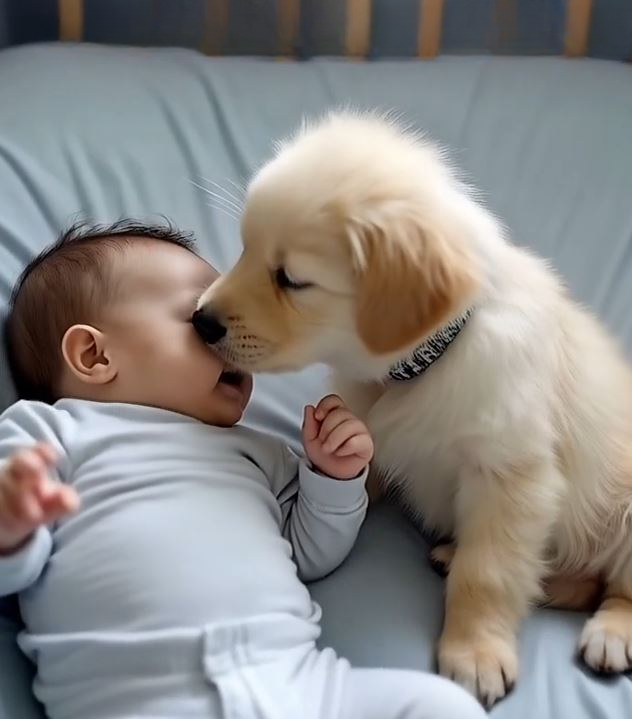The Dog Who Woke the Silence
The house had fallen into a silence so thick, it felt like it could press the air from your lungs. It wasn’t the peaceful kind of quiet—it was heavy, suffocating, crawling into your bones and settling in every corner with a weight you couldn’t shake.
Outside, storm clouds sagged low over the street. Wind scraped at the windows like unseen fingers. Somewhere in the distance, a dog barked, but inside these walls, there was nothing. No sound. No life.
Max, a golden retriever pup barely ten weeks old, stood at the edge of the room. He didn’t bark. He didn’t move. He simply watched—head tilted, eyes filled with a strange, almost human wisdom. Then, without hesitation, he padded across the floor toward the crib.
“Max, no,” Sarah whispered. But she didn’t reach him in time.
The puppy leapt softly inside and curled himself around the small, still figure lying there. That was Noah. Fragile. Motionless.
Born with a rare neurological disorder, doctors had told Sarah and her husband, Emil, that their son might never walk, talk, or even smile. At eighteen months old, Noah had done none of those things.
They had tried everything—specialists, therapies, experimental treatments, even traveling overseas in search of hope that never came. Noah rarely moved, his gaze fixed on the ceiling with empty eyes. Once, Sarah thought she saw a flicker of a smile, but convinced herself it was only her imagination.
They hadn’t planned on getting a dog. Sarah still wasn’t sure why she’d said yes when her sister called from a shelter, urging her to take the last golden retriever pup no one wanted. But when she saw Max—small, timid, eyes searching for something—something inside her softened.
From the moment Max arrived, he was drawn to Noah. He didn’t bounce or bark or beg for play. Instead, he stayed close. Slept beside the crib. Whined when Noah was carried away. Watched him with an almost sacred protectiveness.
And then, on that stormy night, for the first time, Max climbed into the crib.
By morning, everything was different.
Sarah awoke to a sound she hadn’t heard in months—laughter. Faint, scratchy, uncertain. Like an engine sputtering back to life. At first, she thought it was the TV. But it wasn’t. It was Noah.
She ran to the crib. Her son’s tiny fingers were tangled in Max’s fur, moving deliberately. Max lay perfectly still, tail sweeping slowly, as though he understood the holiness of the moment.
The doctors called it coincidence. “Involuntary movement,” they said. But the days that followed told another story. Noah began turning his head when Max barked. Two weeks later, he was making sounds—not for Sarah or Emil, but for Max.
There was no medical explanation. Emil sent videos to specialists. No one could explain it. But Sarah didn’t need science. She could see it in her son’s eyes—he was coming back to her.
The moment that undid her came one quiet Sunday morning. She stepped out for coffee and returned to find Noah sitting upright on his own, Max’s paws gently braced at his back, steadying him.
“Noah,” she whispered.
He turned toward her, eyes bright, and said, “Mah.”
Not quite Mama, but close enough to make her drop the cup in her hand.
Six months later, Noah is walking with braces, speaking in short bursts, laughing every day. He calls Max “Mack,” and the dog never leaves his side, shadowing him like he’s guarding the most important soul in the world.
Therapists call it “unexplainable neural stimulation through emotional bonding.”
Sarah calls it a miracle.
Max didn’t cure Noah. But he gave him a reason to try—a reason to wake, to move, to connect.
And sometimes, that’s all it takes to change everything.
Never underestimate the quiet ones. Sometimes, they’re the ones who carry the light back into the world.
